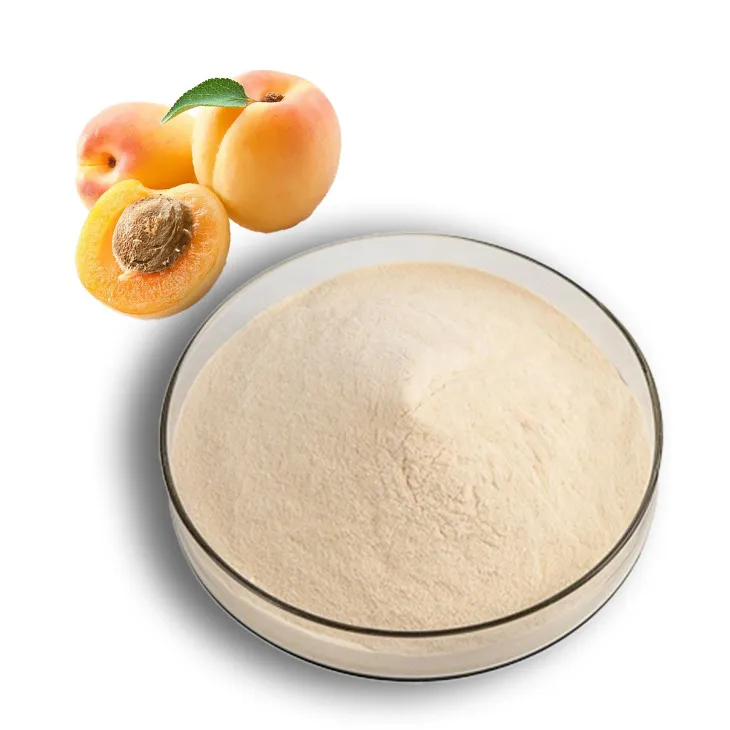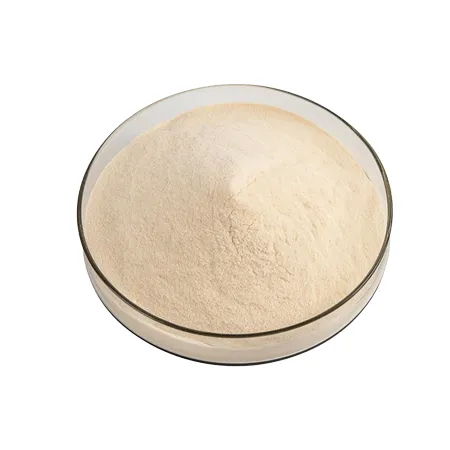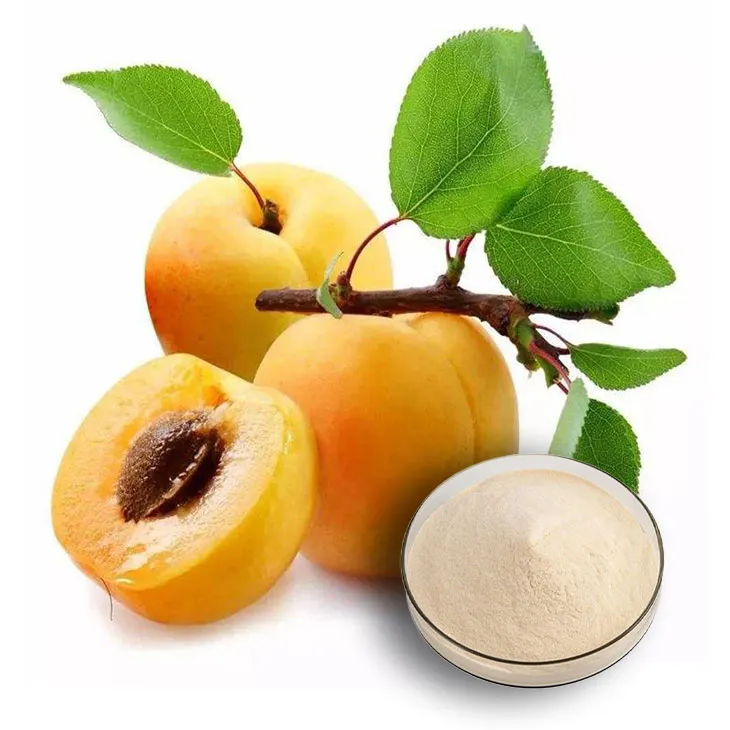- 0086-571-85302990
- sales@greenskybio.com
Apricot powder products: Which extraction technologies should your enterprise invest in?
2024-12-18

1. Introduction
Apricot Powder has gained significant popularity in various industries, including food, cosmetics, and pharmaceuticals. The extraction technology used to produce Apricot Powder plays a crucial role in determining its quality, purity, and market value. In this article, we will explore different extraction technologies for Apricot Powder production and discuss how businesses can choose the best one based on efficiency, purity, and market demands.

2. Common Extraction Technologies
2.1 Solvent Extraction
Solvent extraction is one of the most widely used methods in apricot powder extraction. This process involves using a solvent to dissolve the active compounds from apricot fruits or kernels. Commonly used solvents include ethanol, hexane, and ethyl acetate.
-
Advantages:
- High extraction efficiency: Solvents can effectively dissolve a wide range of compounds, resulting in a relatively high yield of apricot powder.
- Selectivity: Different solvents can be chosen based on the desired compounds to be extracted, allowing for some degree of selectivity.
-
Disadvantages:
- Solvent residues: There is a risk of solvent residues remaining in the final apricot powder product, which may pose health risks and require additional purification steps. This is especially a concern in the food and pharmaceutical industries.
- Environmental impact: Some solvents, such as hexane, are not environmentally friendly and require proper disposal to avoid pollution.
2.2 Supercritical Fluid Extraction (SFE)
Supercritical fluid extraction is a more advanced extraction technology. In this method, a supercritical fluid, typically carbon dioxide (CO₂), is used as the extracting agent.
-
Advantages:
- High purity: Since CO₂ is a gas at normal conditions, it can be easily removed from the final product, leaving little or no residue. This makes it ideal for industries with strict purity requirements, such as the pharmaceutical industry.
- Environmentally friendly: CO₂ is a non - toxic, non - flammable gas, and its use reduces the environmental impact compared to traditional solvents.
- Selective extraction: By adjusting the pressure and temperature, the selectivity of the extraction can be controlled, allowing for the extraction of specific compounds from apricot.
-
Disadvantages:
- High equipment cost: The equipment required for supercritical fluid extraction is complex and expensive, which may be a significant investment for small - to - medium - sized enterprises.
- Lower extraction efficiency in some cases: Although it has good selectivity, in some situations, the overall extraction efficiency may be lower compared to solvent extraction, especially when dealing with a large amount of raw materials.
2.3 Pressurized Liquid Extraction (PLE)
Pressurized liquid extraction, also known as accelerated solvent extraction, uses high - pressure and high - temperature liquid solvents to extract compounds from apricot materials.
-
Advantages:
- Fast extraction: The combination of high pressure and temperature can significantly reduce the extraction time, increasing the production efficiency.
- Less solvent consumption: Compared to traditional solvent extraction methods, pressurized liquid extraction can use less solvent to achieve a similar extraction result, which is more cost - effective and environmentally friendly.
-
Disadvantages:
- Equipment requirements: The equipment needs to be able to withstand high pressure and temperature, which also requires a certain investment. And the operation and maintenance of the equipment are more complex.
- Limited selectivity: Although it can extract a variety of compounds, its selectivity is not as good as supercritical fluid extraction, and it may extract some unwanted compounds along with the target ones.

3. Factors to Consider in Choosing an Extraction Technology
3.1 Efficiency
Efficiency is a key factor for businesses considering apricot powder extraction. It includes both the extraction yield and the production speed.
- For solvent extraction, as mentioned before, it generally has a relatively high extraction yield, but the extraction time may be longer depending on the solvent used and the extraction conditions.
- Supercritical fluid extraction may have a lower extraction yield in some cases, but it can be more efficient in terms of obtaining high - purity products in a shorter time when the equipment is properly optimized.
- Pressurized liquid extraction offers fast extraction, which can increase the overall production efficiency, especially for large - scale production. However, its efficiency may also be affected by factors such as the type of solvent and the quality of the raw materials.
3.2 Purity
Purity is crucial, especially for apricot powder used in the pharmaceutical and high - end cosmetic industries.
- Supercritical fluid extraction stands out in terms of purity as it leaves minimal or no residue in the final product. This is highly desirable for products that need to meet strict regulatory requirements regarding purity.
- Solvent extraction may require additional purification steps to remove solvent residues, which can increase the production cost and time. However, with proper solvent selection and purification processes, it can also produce relatively pure apricot powder.
- Pressurized liquid extraction may extract some impurities along with the target compounds due to its relatively limited selectivity. Therefore, additional purification steps may be necessary to achieve high purity.
3.3 Market Demands
Market demands play an important role in determining the extraction technology.
- If the market demands apricot powder for general food use, solvent extraction may be a viable option considering its cost - effectiveness and relatively high extraction yield. However, the company needs to ensure that the solvent residues are within the acceptable limits set by food safety regulations.
- For the pharmaceutical and high - end cosmetic markets, which require high - purity products, supercritical fluid extraction or a more purified form of solvent extraction may be more suitable. These industries are willing to pay a higher price for products with excellent purity and quality.
- If the market is price - sensitive and also requires a relatively fast production process, pressurized liquid extraction could be considered. It can balance the production speed and cost while still meeting certain quality requirements.

4. Cost - Benefit Analysis
When choosing an extraction technology for apricot powder production, a cost - benefit analysis is essential.
-
Initial investment:
- Supercritical fluid extraction has the highest initial investment due to the complex and expensive equipment required. This includes the cost of the supercritical fluid extraction system, which can be a significant financial burden for small enterprises.
- Pressurized liquid extraction also requires specialized equipment that can withstand high pressure and temperature, so the initial investment is also relatively high, but lower than that of supercritical fluid extraction.
- Solvent extraction has the lowest initial investment as the equipment is relatively simple and inexpensive. However, it may require additional investment in solvent storage and purification facilities depending on the solvents used.
-
Operating costs:
- Solvent extraction may have high operating costs due to the cost of solvents, especially if large amounts of solvents are required. Additionally, the cost of solvent disposal and purification to meet regulatory requirements also adds to the operating cost.
- Supercritical fluid extraction has relatively low operating costs in terms of raw materials as CO₂ is relatively inexpensive. However, the energy consumption for maintaining the supercritical state can be significant, especially for large - scale production.
- Pressurized liquid extraction has lower solvent consumption compared to solvent extraction, which can reduce the operating cost. But the energy consumption for maintaining high pressure and temperature also needs to be considered.
-
Revenue potential:
- Products obtained from supercritical fluid extraction may have a higher market value due to their high purity, especially in the pharmaceutical and high - end cosmetic markets. This can lead to higher revenue potential in the long run.
- Solvent - extracted apricot powder may have a lower market value in some markets due to potential solvent residue concerns, but it can still be profitable in the general food market where cost - effectiveness is a key factor.
- Pressurized liquid extraction - produced apricot powder can target mid - range markets where the balance between cost and quality is important, and thus has a certain revenue potential depending on market positioning.
5. Conclusion
Choosing the right extraction technology for apricot powder production is a complex decision that requires considering multiple factors such as efficiency, purity, market demands, and cost - benefit. Each extraction technology - solvent extraction, supercritical fluid extraction, and pressurized liquid extraction - has its own advantages and disadvantages. Businesses need to carefully evaluate their own resources, market positioning, and product requirements to make an informed decision. For those aiming at the high - purity, high - end markets such as pharmaceuticals and high - end cosmetics, supercritical fluid extraction may be the best choice despite its high initial investment. For companies focused on cost - effective production for the general food market, solvent extraction could be a viable option with proper control of solvent residues. And for those seeking a balance between production efficiency, cost, and quality for mid - range markets, pressurized liquid extraction may offer a suitable solution.
FAQ:
What are the common extraction technologies for apricot powder?
Some common extraction technologies for apricot powder include solvent extraction, supercritical fluid extraction, and mechanical pressing. Solvent extraction uses solvents like ethanol to extract the desired components from apricots. Supercritical fluid extraction often uses carbon dioxide in a supercritical state which has properties between a gas and a liquid, offering high selectivity. Mechanical pressing is a more traditional method where physical force is applied to extract oils or substances from apricots.
How does extraction technology affect the purity of apricot powder?
Different extraction technologies can have a significant impact on the purity of apricot powder. For example, in solvent extraction, if the solvent is not completely removed during the drying process, it can leave residues, reducing the purity. Supercritical fluid extraction, on the other hand, can often achieve higher purity as it can selectively extract the target compounds without leaving behind many impurities. Mechanical pressing may also introduce some impurities from the physical parts of the apricot if not properly filtered.
Which extraction technology is the most efficient for apricot powder production?
The efficiency of an extraction technology depends on various factors. Supercritical fluid extraction can be very efficient in terms of extracting specific compounds quickly and with high selectivity. However, it requires specialized equipment which can be costly. Solvent extraction is relatively simple and can handle large volumes, but the process of solvent removal can be time - consuming. Mechanical pressing is efficient in terms of simplicity and low - cost equipment, but the yield may be lower compared to other methods.
How do market demands influence the choice of extraction technology for apricot powder?
Market demands play a crucial role. If the market demands high - quality, pure apricot powder with specific health - promoting compounds, supercritical fluid extraction might be preferred as it can produce a purer product. If cost - effectiveness is a major factor in the market, solvent extraction or mechanical pressing could be more suitable. Also, if there is a demand for a more natural - looking and - tasting product, mechanical pressing may be a better choice as it involves less chemical processing.
What are the cost implications of different extraction technologies for apricot powder?
The cost implications vary widely. Supercritical fluid extraction has high initial equipment costs and requires trained operators, but it can save on costs in the long run if high - value products are being produced. Solvent extraction has relatively lower equipment costs, but the cost of solvents and their proper disposal can add up. Mechanical pressing has the lowest equipment cost, but the yield may be lower, which could mean higher costs per unit of apricot powder produced.
Related literature
- Advances in Extraction Technologies for Fruit - Based Products"
- "Comparative Study of Extraction Methods for Apricot - Derived Compounds"
- "The Impact of Extraction Technology on the Quality of Fruit Powders"
- ▶ Hesperidin
- ▶ citrus bioflavonoids
- ▶ plant extract
- ▶ lycopene
- ▶ Diosmin
- ▶ Grape seed extract
- ▶ Sea buckthorn Juice Powder
- ▶ Beetroot powder
- ▶ Hops Extract
- ▶ Artichoke Extract
- ▶ Reishi mushroom extract
- ▶ Astaxanthin
- ▶ Green Tea Extract
- ▶ Curcumin Extract
- ▶ Horse Chestnut Extract
- ▶ Other Problems
- ▶ Boswellia Serrata Extract
- ▶ Resveratrol Extract
- ▶ Marigold Extract
- ▶ Grape Leaf Extract
- ▶ blog3
- ▶ blog4
- ▶ blog5
-
Certified Organic Almond Extract Powder Set.
2024-12-18
-
Dan Shen Root Extract/Salvia Root Extract
2024-12-18
-
Curcuma Longa Extract/Turmeric extract
2024-12-18
-
Konjac Powder
2024-12-18
-
Okra Extract
2024-12-18
-
Grapefruit Seed Extract Powder
2024-12-18
-
Troxerutin
2024-12-18
-
Angelica sinensis extract
2024-12-18
-
Wheat Germ Extract
2024-12-18
-
Rose Hip Extract
2024-12-18
-
Elderberry Extract
2024-12-18





















